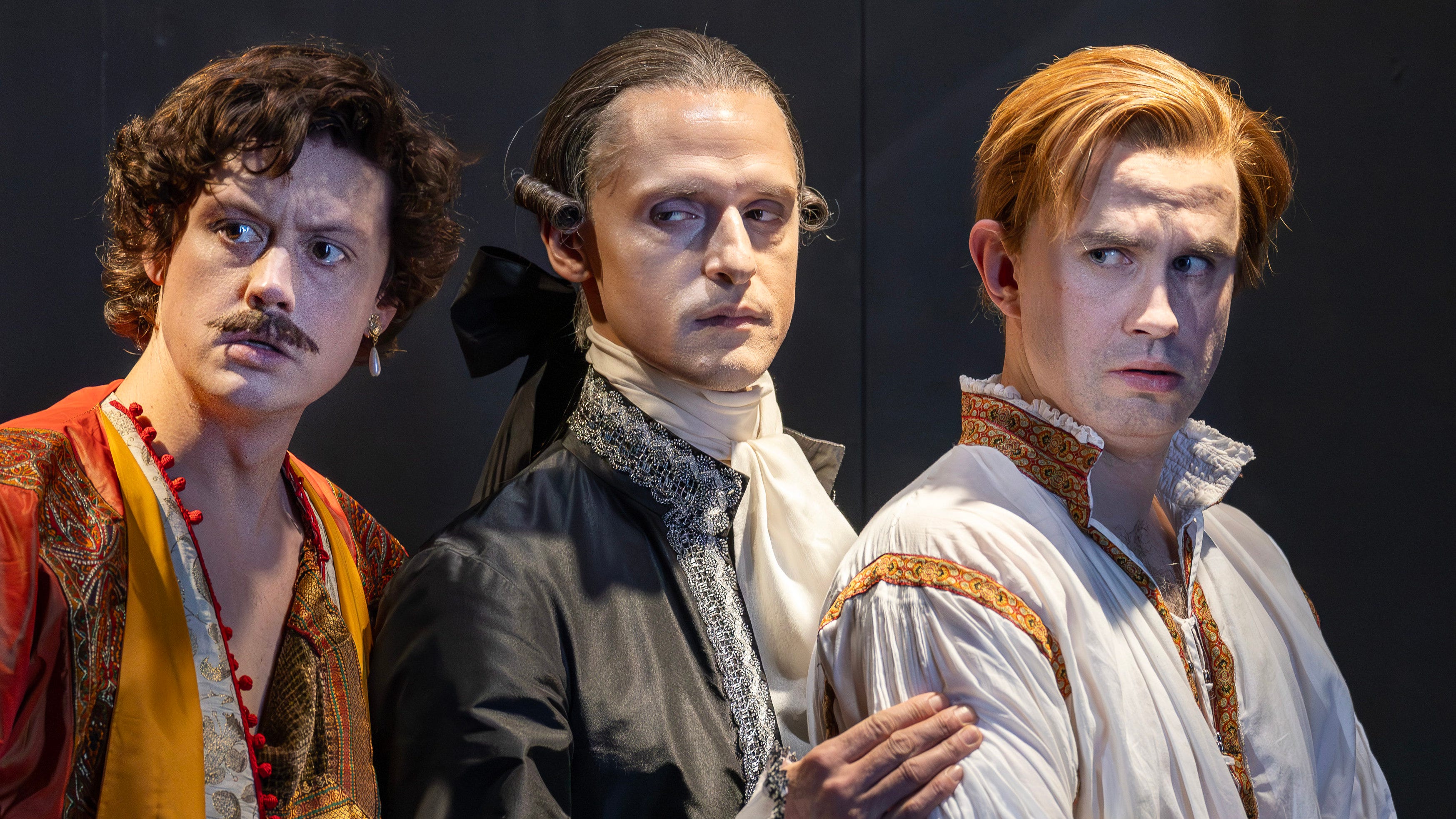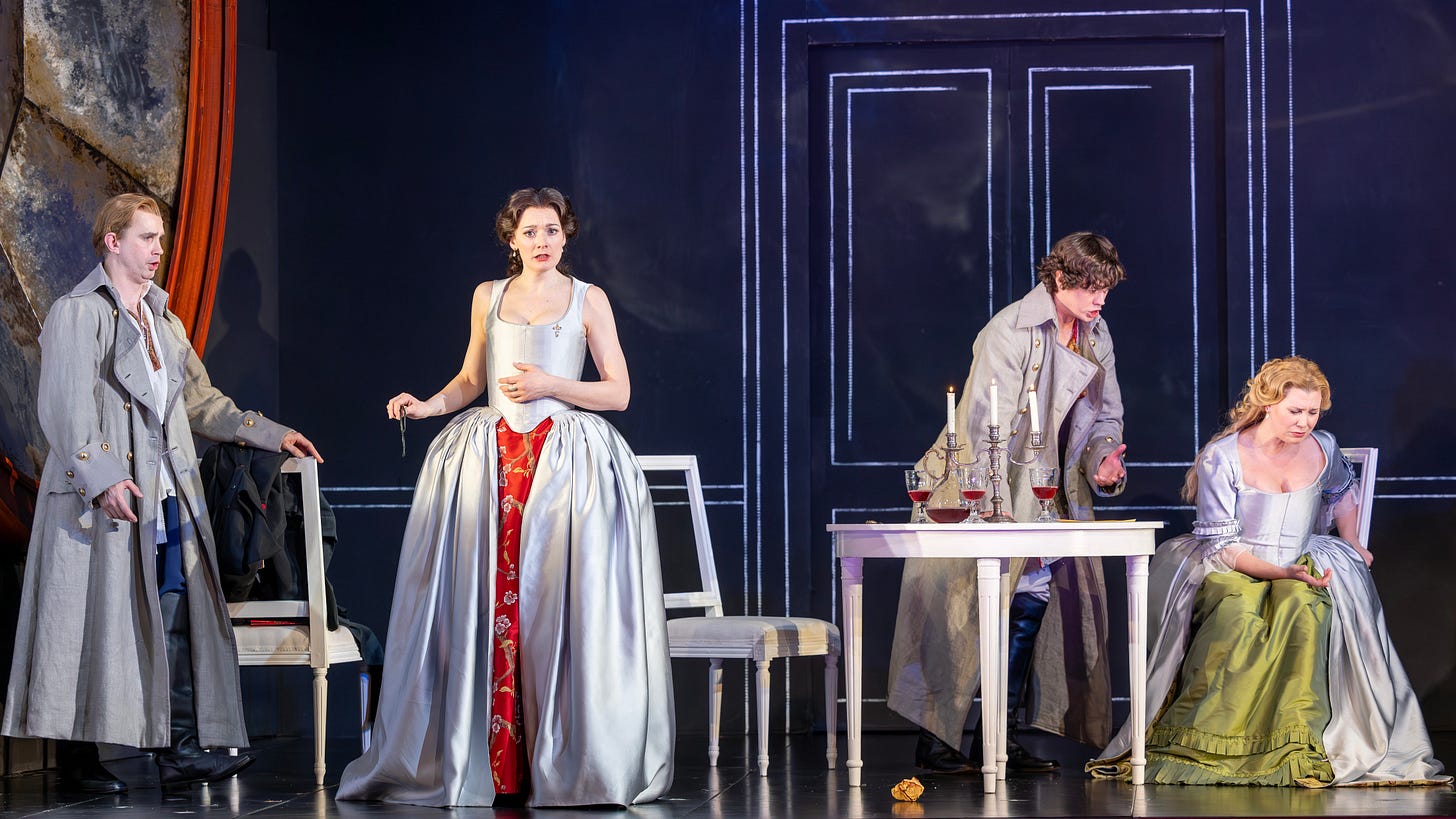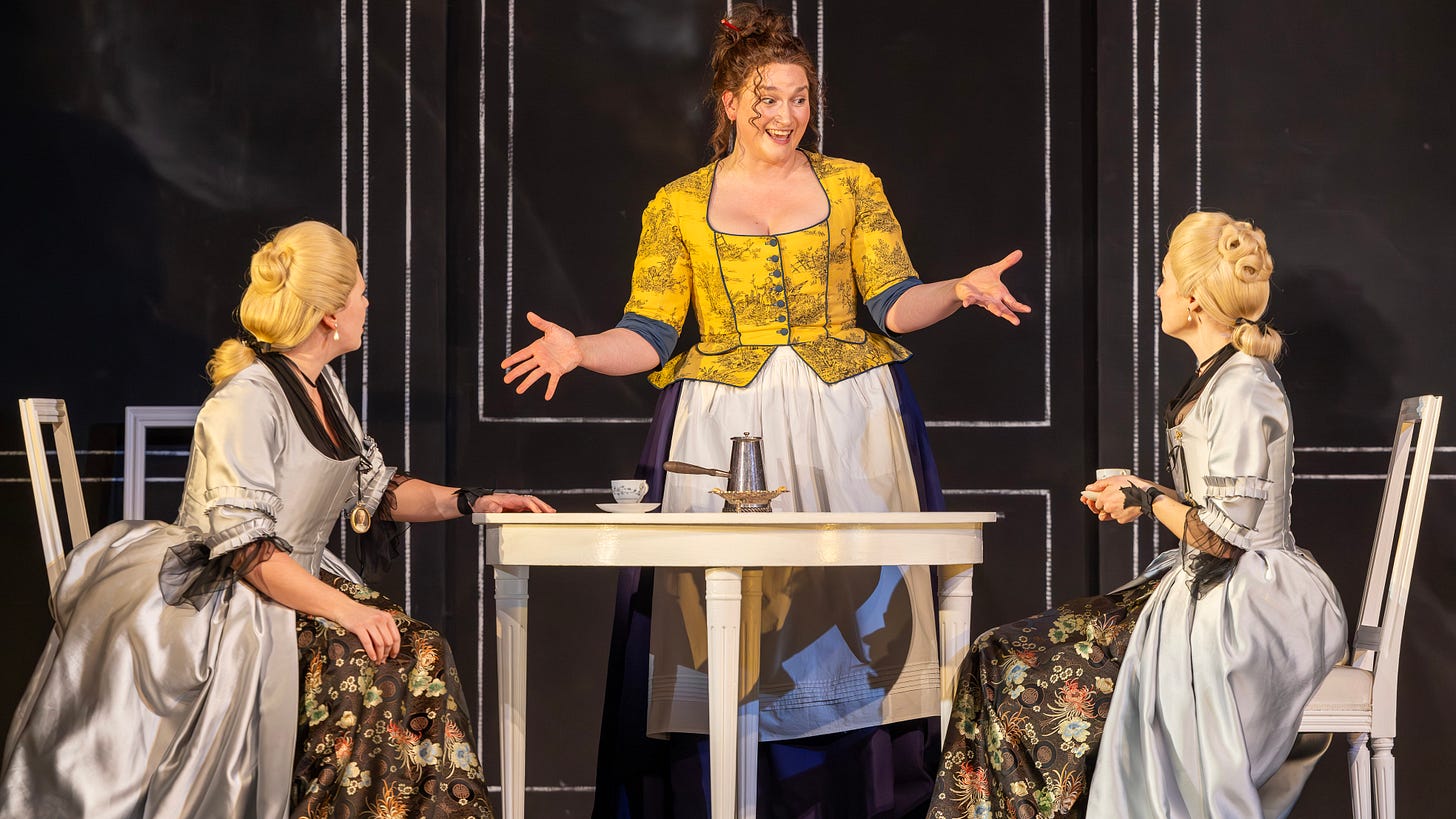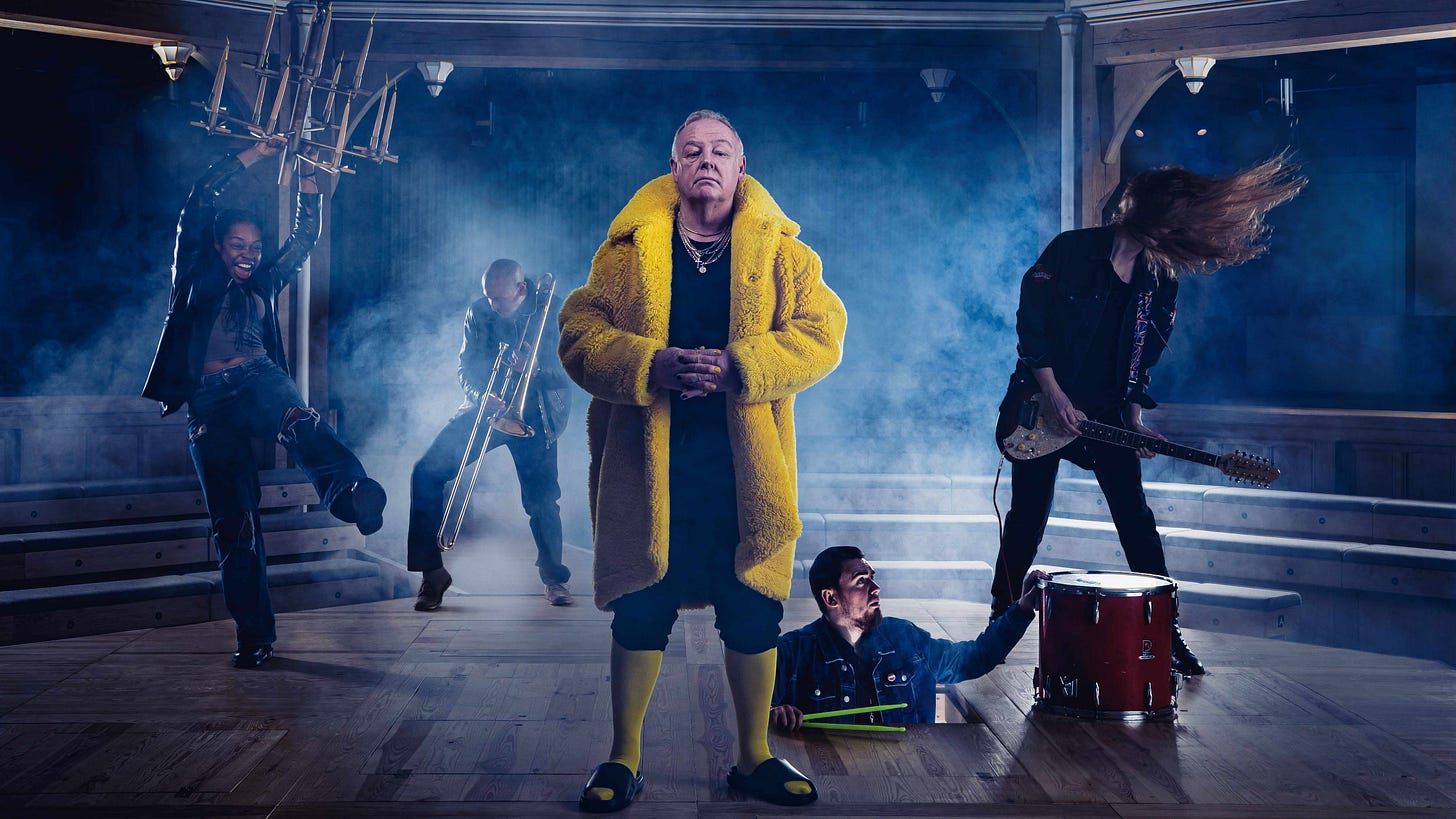Human Hearts Under The Microscope: Opera North's Revival of Mozart's Cosi Fan Tutte
It's Funny... Until It Isn't

Fiordiligi and Dorabella are a pair of silly bitches. These sisters are in love with dashing young military men Ferrando and Guglielmo who, by the overly neat geometrics of dramatic storytelling, are themselves best friends as well as being brothers in arms.
The stage is set for a romantic double wedding — until the elderly Don Alfonso intervenes. He’s a cynical philosopher, and he’s irritated by the false moral pride — what we would nowadays call “lack of self-awareness” — of the two girls, and the complacency of their lovers.
‘Cosi Fan Tutte’ means ‘women are all the same’. For a long time, this comic opera’s reputation was overshadowed by two of Mozart’s other acknowledged greats, The Marriage Of Figaro and Don Giovanni, which he also co-created with librettist Lorenzo Da Ponte. Cosi is an inch away from being a tragedy, and the emotional cruelty of Don Alfonso’s meddling makes it a difficult swallow for contemporary audiences. The Victorians, meanwhile, hated Cosi for a different reason — the shameless sensuality of both plot and music. One of its themes is: “Hey guys, women can enjoy sex too.”

Given the shallowness of the plot, the key to Cosi’s greatness is its moment in history. Da Ponte’s saucy libretto (perhaps written for Salieri who, if so, failed to make use of it) came together with Mozart’s music in Vienna around 1790. This was 14 years after the American Declaration of Independence and five years after the Storming of the Bastille in faraway Paris.
Revolution was in the air. Anything went. But, like the 1960s and 1970s, no-one was sure how far you could actually go. And some people went too far.
Mozart was happily married to Constanze, but Da Ponte was a player. He had many mistresses and a womaniser’s knowledge of, and contempt for, the types of women who fell for his chat-up lines. The script he delivered to Mozart is, unlike many librettos, a drama that actually works as a well-crafted story. All four lovers go on a journey — one that leaves them sadder, wiser and — like the audience — a bit confused.

Shakespeare’s independent-minded Rosalind (As You Like It, Act 4 Scene 1) says: I had rather have a fool to make me merry than experience to make me sad; and to travel for it too.
But to the post-religious Enlightenment mindset, knowledge — including self-knowledge — is worth having. Faith is no longer enough. Modern individuals demand proof.
To this end, Cosi Fan Tutte puts human hearts under the microscope; and to emphasise that point, Tim Albery’s revived 2004 production takes place inside a giant camera obscura. The box opens to reveal a psychological experiment which is as cruel as anything performed at Stanford University.
Don Alfonso persuades Ferrando and Guglielmo to tell their girlfriends that, although they hate to leave them, they have been mobilised to fight a war, and will have to go. The women are distraught. But pity soon gives way to irritation as we realise that Don Alfonso is correct. Their hysterical protestations are immature and self-focussed. They really know very little of love.
Embarking on this three hour voyage into operaland I was heartened by the realism which baritone Henry Neill (Guglielmo) and tenor Antony Gregory (Ferrando) brought to their early interactions with Quirijn de Lang (Don Alfonso). As young men they have agency. They joke around very convincingly and think the set-up they are planning is hilarious.
But when they return, disguised as, er, Albanians?, to seduce Fiordiligi (soprano Alexandra Lowe) and Dorabella (mezzo Heather Lowe) away from their chaste intentions, complacency gives way to anger, and then hurt, and finally the uncomfortable realisation that they have behaved despicably.

Meanwhile the sisters’ put-upon maid Despina (soprano Gillene Butterfield) needs very little encouragement to stir the pot. She works hard to keep Fiordiligi and Dorabella in elegant comfort but instead of provoking the sisters’ gratitude this loyalty gives them the leisure to be maudlin about the departure of lovers whom Despina thinks are entirely replaceable.
It is Despina, with her wit, sass and ingenuity, who convinces me that Mozart and Da Ponta did ultimately want the best for women, and thought their alleged inferiority was a product of circumstances. The two sisters are at first useless — this is obviously the result of their social incarceration. Both, to some degree, will fall from virtue — but in different ways and at different paces. By the end of the opera they have lost their innocence but have been gifted with that precious Enlightenment quality — individualism.
Nonetheless, it’s troubling. I may choose to suffer in the pursuit of wisdom but you don’t have the right to make that choice for me.
It’s an ensemble piece. Tim Albery’s enduring production emphasises the suffocating “lab rat” quality of the cast’s interactions with each other by removing the Opera North chorus discreetly out of sight. Gillene Butterfield, lifted from this very chorus to sing a role, delivers her Despina character with zest and charm. The sensible advice she gives them — stop behaving as though men are a scarce commodity, there’ll be another one along in a minute — wouldn’t be out of place in a contemporary dating manual. The other two females just have less to work with, characterwise, until the proverbial really hits the fan.
You can argue (and many have) that this opera is far-fetched — even by the inexacting standards of opera. The sisters not only fail to recognise their disguised lovers but even their own maid, who they see every day, when she turns up in drag pretending to be someone else. But contemporary stories abound of real men and women who have been scammed out of large sums of money — even selling or remortgaging their houses — by fantasy lovers who only exist as phone calls and text messages. Longing for love can turn ordinary people into easy prey when the stakes are as large as finding a life partner.
So perhaps Fiordiligi and Dorabella got off lightly. The heroic lovers they fantasised about were, in the end, just real men prepared to marry them despite their ridiculous failings. And that, in this fallen world of human imperfection, is what this opera counts as a happy ending.
I could see why Albery’s classic production, sung in English, is such a staple in Opera North’s repertoire. It finds the uncomfortable depths in a piece that might equally be played for its ‘Allo, ‘Allo slapstick laughs. As for the musical performances — apart from a single moment when Alexandra Lowe almost lost her footing on the stepped stage — this is a well-oiled piece that to my inexpert ears ran like clockwork. And perhaps the orchestral players, conducted by Clemens Schuldt with a lovely lightness of touch, were too proficient for their own good. They made it sound so easy. The well-shod Leeds audience, mysteriously short on first-night energy, never quite gave back what I felt this slick production deserved.
Cosi Fan Tutte runs in repertoire at the Grand Theatre Leeds until Feb 23 (£14.50-£85.50), then travels to the Theatre Royal, Nottingham Mar 7 & 9, the Theatre Royal, Newcastle, Mar 14 & 16, The Lowry, Salford Quays, Mar 21 & 23, and Hull New Theatre, Apr 4 & 6
What’s On Feb 11-24
Before the curtain rose on Cosi Fan Tutti, I found myself chatting to Rozina Breen, the Chair of Leeds Playhouse. An experienced current affairs journalist at the BBC, she wasn’t going to let slip anything controversial. But she did share with me that the Playhouse’s Christmas production of Oliver Twist had performed 20% better than expected at the box office.
It’s one more clue that in the UK, for the right play in the right place, theatre audiences have finally bounced back from the pandemic. Perhaps this isn’t so surprising; affluent theatre-goers have been less affected by the cost-of-living crisis than the truly poor because their spend on food, energy and housing represents a smaller part of their household budgets.
For even moderately well-off households in the chilly UK, January can be a bleak time — spent-up after Christmas, and with winter fuel bills hitting hard. But by February, some bank balances are recovering. And, by the predictable rhythms of the theatre year, this is a time when many smaller companies stage their local pantomimes. This is great news for anyone who wishes to watch theatre on the cheap. You can have a hilarious night out with your kids for a fraction of the cost of travelling to see a mainstage production. (This honestly shouldn’t need saying, but I’m constantly chatting with work colleagues whose benchmark for ‘seeing a show’ is some lavish West End production booked as part of a special anniversary trip to London.)
Some Cheaper Options
But theatre needn’t be expensive. Timed to coincide with half-term, Middle Child Theatre, in association with community arts organisation Back To Ours is touring Red Riding Hood to church halls and community centres around Hull. St Aidan’s Church, Southcoats Ave, Wed 14 Feb, Edinburgh Community Centre, Woodcock St, Thu 15 Feb, St Michael’s Church Hall, Orchard Park Rd, Fri 16 Feb, St Steven’s Neighbourhood Centre, Annandale Rd, Sat 17 Feb, £3.
And while both Middle Child and Back To Ours are very much enmeshed in the arts establishment, enjoying substantial subsidy from public funds and charitable foundations, there is no evidence that this is the case for children’s entertainer Magic Mike. Expect racuous end-of-the-pier mayhem as his biggest production yet, Chuck And The Beanstalk, travels along the East Coast to Whitby Pavilion, Feb 12, £12.50, Scarborough Spa, Feb 14, £12 and Bridlington Spa, Feb 15, £11.
Another way to get your theatre fix on the cheap is by taking amateur companies seriously. This month the Ilkley Players are tackling Andrew Bovell’s modish physical drama Things I Know To Be True, Ilkley Playhouse, Feb 13-17, £6 & £10. And the Skipton Players (Skipton Little Theatre) present God’s Dice, a tragi-comedy by David Baddiel which interrogates the existence of a benign deity. At the start of his career, Baddiel was best known as a comedian. Now he writes and campaigns about the very serious subject of anti-semitism. Feb 20-24, £6 & £12
And for those living with late-stage dementia, Smashing Mirrors have created a charming little show set in the 1960s. Mike And Millie’s Winter Wonderland explores happy memories of snowy days using music, dance, mime and rhyme. Pocklington Arts Centre, Feb 22, Hull Truck Theatre, Feb 23, 11am (returns only), Ropery Hall, Barton On Humber, Feb 23, 2pm, all tickets free but booking advised
Fashionable Nonsense
Another place to look for inexpensive entertainment is in the nooks and crannies of larger theatres away from the main house. Queer Spaces: Live in the Stephen Joseph Theatre is a ‘celebration of queer spaces’ created by local writers in collaboration with with writer and dramaturg Frazer Flintham. You might think, as an out and proud terf, that I’d be against this sort of thing. Au contraire. I’ve no objection to queer people doing queer things in queer places. I just think queer theory, and its related manifestations, is intellectual bollocks. And mysogynist. And homophobic. And a funding racket!
To my mind, the fashion for queerness is best understood as doing what the various youth tribes and youth cultures have always done, since the days when Mods and Teddy Boys clashed on Southend beach. This is to bring misfits and oddballs together in a place they can call family. Getting such lost souls into an actual room to create drama is clearly an improvement on abandoning them to the perversions of cyber space.
In fact, unlike the very real discrimination faced by same-sex attracted people (especially present-day lesbians), ‘queerness’ is so vaguely defined that anyone can join. Just shave your head and don some hideously coloured eye-shadow. I might even have a go myself some time. Feb 22, pay what you decide
Actual Oppression
Actual oppression is no laughing matter; but triumphing over it can be uplifting. If you want to hear The Moon And The Pilot, which in 2015 the folk musician Mike Harding described in all seriousness as “the most beautiful song in the last 10 years” get yourself to The Courthouse, Thirsk on Feb 22, £8 & £10. Daria Kulesh is part-Russian and part Ingush. (Ingushetia is a remote, semi-independent republic in the North Caucasus.) Long Lost Home tells the story of her Ingush family’s deportation by Stalin to Siberia. She then travels to Newton-le-Willows (the Yorkshire one near Bedale) to perform at the village hall. Feb 23, Tickets from Bob on 01677 450715.
Looking Ahead
Finally, a heads up because tickets may sell out. If you can face it after Cosi Fan Tutti, there’s more brutal humour on display at Shakespeare North in June. Not Too Tame, a theatre company based in Warrington, north-west England, recruit working-class actors to perform in plays steeped in working-class culture. Popular comedian Les Dennis stars as Malvolio, the Lady Olivia’s ambitious steward, in Shakespeare’s comedy Twelfth Night. Jun 7-29, £14.72-£38
That’s it for this edition. Substack is telling me I’ve run out of space. But after my £80-quid-a-ticket opera shout (cheaper tickets are available) I thought a reminder that all theatre is not main stages would be useful.
Soon, I will be heading out on An Adventure. I am very excited about this. Of which, more next time!
Liz x





